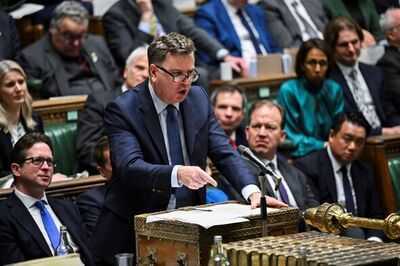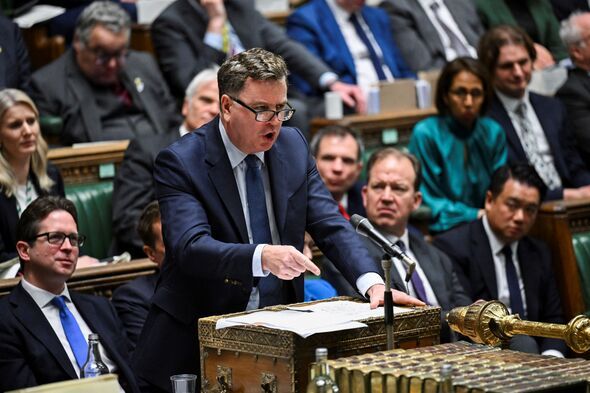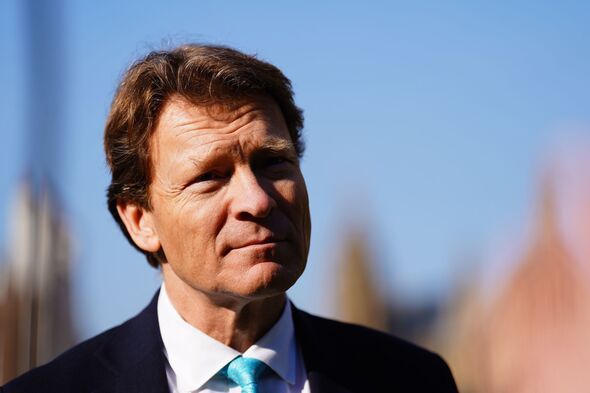
Rachel Reeves was branded "reckless" and blamed for tanking the economy after announcing scything spending cuts to balance the books. The beleaguered Chancellor was forced to lay out a set of humiliating cuts to offset stalling growth.
Ms Reeves stressed the grim realities facing the country as she delivered her spring statement to the Commons, arguing the "world has changed". The desperate excuse came as she scrambled to fill a £14billion black hole in the finances, after her massive tax-and-spend Autumn Budget was followed by an economic slowdown. Amid a dire economic forecast, the Chancellor swung the axe at Britain's bloated welfare bill - lopping off £3.4billion.


Ms Reeves also confirmed that at least 10,000 civil service pen-pushers will have their jobs abolished, with desperately needed cash redirected to front-line services such as policing.
In a bitter blow to the Chancellor, the Office for Budget Responsibility downgraded its economic forecast for 2025 from 2% to an embarrassing 1%. The cost of living will also remain high this year with the OBR forecasting inflation averaging 3.2%, instead of the 2.5% it anticipated in October.
Furthermore, the tax burden is still on track to hit a record high, with frozen thresholds inflicting more pain on Britons. To make matters worse for the Chancellor, the unemployment rate is expected to peak at 4.5% this year, higher than predicted before.
There were shreds of promising news with the OBR predicting that the measures announced in her statement will result in Treasury coffers achieving a surplus of £6 billion in 2027-28 and £9.9 billion in 2029-30. And households are predicted to be £500 better off each year by 2029.
The reforms will also permanently increase levels of real GDP - but only by a meagre 0.2%, translating to £6.8 billion, by 2029-30. Meanwhile, house-building will hit a 40-year high.
Responding to the growth forecast, with a sea of thunderous Labour faces behind her, Ms Reeves said: "I am not satisfied with these numbers.
"That is why we on this side of the house are serious about taking the action needed to grow our economy. Backing the builders, not the blockers."
Despite the dramatic downgrade in 2025, she said the OBR had upgraded its forecasts for subsequent years with GDP expected to increase by 1.9% in 2026, 1.8% in 2027, 1.7% in 2027 and 1.8% in 2029. But worryingly, the OBR cautioned that even that sluggish performance could easily be derailed by Donald Trump's trade war or failure to secure productivity advances in the public sector.
Ms Reeves added: "The increased global uncertainty has had two consequences. First, on our public finances. And second, on the economy."
At her budget in October she set out plans which met that goal with £9.9 billion to spare in 2029/30.
But she said the updated forecast from the Office for Budget Responsibility indicated she would have missed the target by £4.1 billion without taking action to restore the £9.9 billion of headroom.
She confirmed a further squeeze on the welfare budget, building on cuts to the disability and incapacity bill set out earlier this month, with the package now expected to save £4.8 billion rather than the more than £5 billion in 2029/30 hoped for by ministers.
And she signalled cuts in Whitehall, with "voluntary exit schemes to reduce the size of the civil service", taking advantage of technology to "make Government leaner, more productive and more efficient", saving £3.5 billion by 2029/30.
Ms Reeves said that overall, day-to-day spending will be reduced by £6.1 billion by 2029/30 and it will now grow by an average of 1.2% a year above inflation, down from the 1.3% forecast at the time of the budget.
The OBR said the £14 billion of measures to restore Ms Reeves's headroom came from "direct savings from welfare reforms and the reduction in day-to-day departmental spending" along with the "indirect boost" from the planning reforms.
The budget watchdog acknowledged a series of international factors at play, including the risk of a trade war triggered by the US president's tariff policies, but it also acknowledged a slump in business and consumer confidence since Ms Reeves's first budget.
It said that "significant uncertainty" surrounds both domestic and global economic developments, warning that if global trade disputes escalate to include 20 percentage-point hikes in tariffs between Mr Trump's US and the rest of the world it would knock 1% off GDP and almost wipe out Ms Reeves's headroom.
The watchdog also estimated inflation will average 3.2% this year, before falling to 2.1% in 2026 and then hit the 2% target from 2027.
The OBR said higher energy and food prices and "more persistently high wage growth" will cause inflation to hit a peak of 3.7% in the middle of this year.
Shadow chancellor Mel Stride accused Ms Reeves of having "tanked the economy".
"She taxed jobs and wealth creation, she's destroyed livelihoods, businesses clobbered big and small, small companies - the backbone of our economy, enterprise - crushed on the altar of her ineptitude," he said.
Reform UK Deputy Leader, Richard Tice branded the "emergency budget" a "disaster" and said it was "entirely avoidable".
"The economy is shrinking, growth is collapsing towards recession, energy bills soaring because of net zero, the cost of government borrowing soaring back to 15 year highs and the job market is collapsing," he warned.
CPS Director Robert Colvile said the Chancellor's spring statement was "fatally undermined by a failure to acknowledge that her own actions have contributed to Britain's economic woes, and continue to do so".